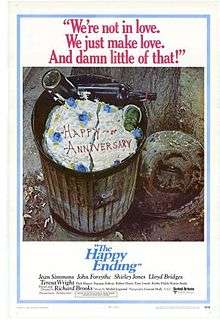The Happy Ending
| The Happy Ending | |
|---|---|
 Theatrical release poster | |
| Directed by | Richard Brooks |
| Produced by | Richard Brooks |
| Written by | Richard Brooks |
| Starring |
Jean Simmons John Forsythe Shirley Jones Lloyd Bridges Teresa Wright |
| Music by | Michel Legrand |
| Cinematography | Conrad L. Hall |
| Edited by | George Grenville |
Production company |
Pax Enterprises |
| Distributed by | United Artists |
Release dates |
|
Running time | 117 minutes |
| Country | United States |
| Language | English |
The Happy Ending is a 1969 drama film written and directed by Richard Brooks, which tells the story of a repressed housewife who longs for liberation from her husband and daughter. It stars Jean Simmons (who received an Oscar nomination), John Forsythe, Shirley Jones, Lloyd Bridges and Teresa Wright.
Synopsis
1953: Through the course of a Colorado autumn and winter, Mary Spencer (Simmons) and Fred Wilson (Forsythe) lead an idyllic existence. Mary drops out of college (with 6 months to go) to marry Fred. Their perfect wedding mirrors the happy endings of the films Mary loves.
1969: It is the Wilsons' 16th wedding anniversary. On his way to work, Fred, a successful tax consultant, tells their maid Agnes (Nanette Fabray) that he has found vodka hidden in Mary's wardrobe and asks Agnes to keep an eye on his wife. Mary sets out for the beauty parlour. At an airline office, however, Mary buys a one-way ticket to Nassau, Bahamas.
On the flight she recalls the horrors of last year's anniversary party, when Fred had drunkenly flirted with a blond divorcee, and she had taken refuge in the bottle and a rerun of Casablanca. At a stop-over, she calls home and learns this year's anniversary party has been a different sort of disaster. Her daughter Marge (Kathy Fields) is scared by Mary's call—it reminds her of the time she had found her mother unconscious after an overdose.
En route to Nassau, Mary meets Flo (Jones), an old college friend she has not seen since 1953. While Mary settled down to married life, Flo has been the mistress of a series of married men. She is on her way to Nassau to meet her latest beau, Sam (Bridges). Mary tells her she has had to get away from Fred, so Flo promises to look after her.
In the Bahamas, Mary enjoys the sun and long, empty stretches of beach. At a casino, she meets Franco (Bobby Darin), a hustler from Los Angeles who is down on his luck. Franco mistakenly assumes that Mary is wealthy. He affects an Italian accent and tells Mary he is a journalist who writes about film stars. She agrees to go to "his" boat, but Franco quickly loses interest when it transpires Mary is not wealthy, confessing his scam.
Walking by the ocean, Mary recalls the occasion of her suicide attempt—she had returned from having a face lift to learn that Fred was in Reno with a girl. Marge had found her and rushed her mother to hospital. After that, Mary resumed drinking, recklessly spent a lot of money, and crashed her car while driving drunk.
In the present, Sam proposes to Flo, who accepts. Mary flies back home. Agnes helps her move into rooms she has rented away from Fred and Marge. She takes a job and enrolls in night classes at the university. It is here that Fred finds her, one evening. "What went wrong?" he asks. "All our friends are married, and they're happy."
Cast
- Jean Simmons as Mary Wilson
- John Forsythe as Fred Wilson
- Shirley Jones as Flo Harrigan
- Lloyd Bridges as Sam
- Teresa Wright as Mrs. Spencer
- Dick Shawn as Harry Bricker
- Nanette Fabray as Agnes
- Bobby Darin as Franco
- Tina Louise as Helen Bricker
- Kathy Fields as Marge Wilson
- Karen Steele as Divorcee
- Gail Hensley as Betty
- Eve Brent as Ethel
- William O'Connell as Minister
- Barry Cahill as Handsome Man
- Miriam Blake as Cindy
- John Gallaudet as Airplane Passenger (uncredited)
- Erin Moran as Marge Wilson as a Child (uncredited)
- Nanci Roberts as Model (uncredited)
Production
The film was rated 'M' certificate, and has a running time of 117 minutes.
Music for the film was composed and conducted by Michel Legrand, the song lyrics by Alan Bergman and Marilyn Bergman. The soundtrack performance of "What Are You Doing the Rest of Your Life?" was sung by Michael Dees and the soundtrack songs "Hurry Up 'N Hurry Down" and "Something for Everybody" were performed by William Eaton. The film was nominated for Academy Awards for Best Actress in a Leading Role, (Jean Simmons) and Best Music, Song (Michel Legrand, Alan Bergman and Marilyn Bergman, for "What Are You Doing the Rest of Your Life?"). The song was one of the eight pieces of music chosen by Jean Simmons when she appeared on the BBC radio programme Desert Island Discs on 9 August 1975.[1]